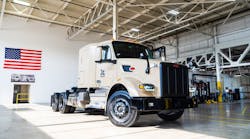Editor's note: This is the fifth and final part in a series on blockchain and its role in trucking. Read Part 1, Part 2, Part 3 and Part 4 here.
While discussion surrounding blockchain technology often focuses on the secure tracking of goods and financial transactions, proponents see truck drivers also reaping benefits. These benefits can start even before a driver is behind the wheel.
Rick Burnett, CEO of LaneAxis, said rather than relying on a sheet of paper, hiring managers can examine an incorruptible record of a candidate’s driving history stored on public blockchain.
John Monarch, CEO of ShipChain, compared a trucker’s driving history on the blockchain with medical records that go with a patient from doctor to doctor.
The technology executives both believe blockchain can give an advantage to safe, experienced drivers, whether they are seeking new positions or making a case for a raise. Likewise, secure records often provide legal protection and quality assurance for both carriers and shippers.
They also said the emergence of blockchain can help maximize fuel usage, optimize real-time routing, and ensure automatic, instantaneous payments.
Blockchain also provides insurance for carriers and geofencing to help ensure accurate pickup and delivery schedules.
According to a Texas A&M Transportation Institute report and other experts, additional benefits of blockchain technology include:
- Preventing cyber attacks on connected vehicles, since their presence in the Internet of Things exposes them to such attacks.
- Ensuring over-the-air updates are tamper proof.
- Facilitating automated payments from vehicles for transactions, including fuel purchases, vehicle registration renewals, and routine maintenance.
- Trusted ledger of maintenance activities performed on a vehicle throughout its life cycle.
- Reducing tolling costs by eliminating the fees that tolling agencies pay on credit card transactions, estimated at more than $300 million annually nationwide. Blockchain could also facilitate the adoption of a nationwide interoperable toll system.
Challenges to blockchain adoption
According to the Texas A&M Transportation Institute, the following are the top challenges to blockchain adoption in trucking:
- The novel nature of blockchain could limit its implementation to demonstration projects.
- The assumption that validation of transactions will fall to a network of computers rather than a traditional third party is a foreign one and may prompt many people to simply disregard it.
- Blockchain is not a formal database nor a cloud, so it cannot store documents; it can only provide a proof of existence.
- The global nature of commerce means parties from multiple languages and currencies are involved, requiring some common data and standards.
This is the fifth and final part in a series on blockchain and its role in trucking. Read Part 1, Part 2, Part 3 and Part 4 here.



